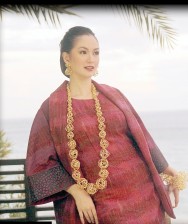
NARDA Capuyan’s collection will be featured at the New York Fashion Week this September. COURTESY OF NARDA CAPUYAN
BAGUIO CITY—Cordillera weaver Narda Capuyan is bound for this year’s New York Fashion Week to display her handwoven fabrics on the international runway, alongside the fabrics of Ilocos Norte, Puerto Princesa City in Palawan, Tabaco City in Albay and Lumban in Laguna.
Capuyan, who owns the garments brand “Narda’s,” said she was taking part in the Philippine fashion and lifestyle segment of the annual Couture Fashion Week at The Waldorf-Astoria Hotel on Sept. 16.
“I spent days weaving new fabrics to showcase the Cordillera,” she said.
Narda’s fabrics were turned into contemporary wear by Filipino designer Barge Ramos and San Francisco-based couturier Joseph Domingo, Capuyan said. These would be worn by American models at the Grand Ballroom show, “Island Treasures at The Waldorf-Astoria.”
“After this New York event, a comprehensive product development and marketing program will be in place [for Narda’s]. We will not mass produce but we will come up with exclusive Cordillera designs that we can offer the fashion capitals of the world,” she said in a statement.
But what should have been good news for the Cordillera has instead polarized its officials and civic leaders.
The Regional Development Council (RDC) on Aug. 31 voted to allow the Department of Trade and Industry (DTI) to tap unspent portions of a P21-million autonomy information and education fund for a Cordillera trade and tourism mission in New York.
RDC members who represent the private sector believe this is a bad call. On Friday, they issued a position paper denouncing RDC’s actions.
The Cordillera Administrative Region (CAR) is campaigning for support to establish itself as an autonomous region, as dictated by the 1987 Constitution, and has been receiving a special autonomy fund (SAF) from the General Appropriations Act each year since 2007.
Two previous laws creating the CAR were rejected in plebiscites in 1990 and 1998, but Congress had since deliberated on House Bill No. 5595 and Senate Bill No. 3115 which pursue a third bid for autonomy.
The Cordillera mission, to be led by the Department of Tourism and the DTI, would go to the United States with Capuyan to promote autonomy there, as well as Cordillera products and investment opportunities, with American businessmen.
By representing the Philippines at the high-profile New York event, the Cordillera delegation could earn goodwill for the country and win support in Congress for its third autonomy bid, said Gerardo Lab-oyan, general manager of Cooperative Bank of Benguet, who joined the RDC meeting last week.
Myrna Pablo, DTI director in the Cordillera, asked the RDC to allocate P489,500 of SAF for the mission, as well as the shipment of fabrics to New York on Sept. 12.
Some Cordillera governors would join Capuyan’s group but they would spend their own money, Pablo said.
NARDA Capuyan’s collection will be featured at the New York Fashion Week this September. COURTESY OF NARDA CAPUYAN
She said New York business groups had scheduled sessions with the mission to discuss project proposals on energy and mining.
The RDC’s private sector representatives, however, said tapping the autonomy fund for the New York show would tarnish the autonomy campaign.
Edna Tabanda, former mayor of La Trinidad, Benguet, and Ibaloi leader Peter Cosalan admonished the RDC, saying tapping the SAF for a fashion show may be illegal.
Tabanda said they were not against the trade and tourism mission but RDC members has been concerned about the way the autonomy fund has been used.
At the Aug. 31 meeting and at a caucus on Sept. 4, National Economic and Development Authority officials said the SAF had been obligated this year and no amount could be spared for the New York mission.
On Aug. 7, members of the RDC’s private sector representatives were told that the RDC executive committee had convinced a Cordillera province to waive its SAF project allocation in favor of the New York mission.
In their position paper, five RDC members, including Tabanda and Cosalan, said: “[We] feel duty-bound to adhere to the purposes for which the [SAF] was originally allocated in the RDC approved work and financial plan, which is for ‘social preparation in the [Cordillera]’ pursuant to the RDC priority goals of attaining ‘autonomy and development in the Cordillera.’”
The group said SAF allocations for local governments were covered by memorandums of agreement and might not simply be realigned.
When asked, Capuyan said the Cordillera trade and tourism mission was a very good cause, but the controversy it generated was unwelcome.
“Narda’s is investing its own resources for its participation in this event as we see this opportunity as the beginning of a new marketing thrust for the new designs, colors and textures of the Cordillera handwoven fabrics that can hit the international market,” she said.